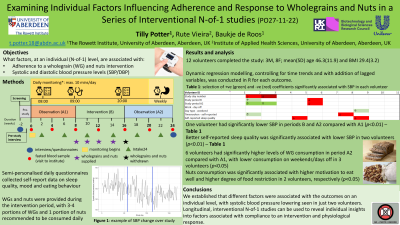Back

Objectives: Inter-individual variations in response to dietary interventions are common, which can be affected by physiological and behavioural factors. N-of-1 studies, where a series of measurements are collected on an individual level over time, can provide insights into the factors which affect response for a single volunteer. The MI-DIET study is a series of N-of-1 studies to investigate what factors, at an individual level, influence a) adherence to a wholegrain and nuts intervention and b) blood pressure response.
Methods: 14 volunteers with mildly elevated blood pressure (120/80-140/90mmHg), and who were low consumers of wholegrain foods, were recruited. Each volunteer carried out a 24-week N-of-1 study, composed of three 8-week periods (observation, intervention and follow-up). Throughout the study, volunteers responded to semi-personalised morning and evening questionnaires using a wrist-worn device (PRO-Diary, CamNtech Ltd.), which also monitored activity levels via actigraphy, and took their blood pressure daily using a wireless monitor (QardioArm, Qardio Inc.). During the intervention period, participants were provided with and asked to consume 3-4 portions of wholegrains and a handful of nuts each day, in line with the Dietary Approaches to Stop Hypertension (DASH) diet.
Results: To date, 11 volunteers have completed the study, and 2 volunteers have withdrawn. Each volunteer’s data is analyzed on an individual level using N-of-1 dynamic modelling analysis. Results to date include a significant association between menstrual cycle day and blood pressure in one volunteer (p < 0.01), while consumption of chocolate or cakes was associated with fewer portions of wholegrains being consumed by another volunteer (p < 0.05).
Conclusions: Collecting repeated measurements on an individual level can identify relevant predictors of compliance and response to a dietary intervention for a given person. Subsequent aggregated analysis of variables measured across multiple volunteers will enable us to further understand factors which may underpin differential response to dietary interventions.
Funding Sources: Biotechnology and Biological Sciences Research Council (BBSRC) UK and Unilever Foods Innovation Centre, Wageningen, The Netherlands: Collaborative Training Partnership (CTP) PhD.
Precision Nutrition/Nutrient-Gene Interactions
(PO27-11-22) Examining Individual Factors Influencing Adherence and Response to Wholegrains and Nuts in a Series of Interventional N-of-1 Studies


Tilly Potter, MMedSci
– PhD student, University of Aberdeen, Aberdeen, Scotland, United Kingdom- RV
Rute Vieira
– University of Aberdeen - Bd
Baukje de Roos
– Rowett Institute, University of Aberdeen
Presenting Author(s)
Co-Author(s)
Disclosure(s):
Tilly Potter, MMedSci: No relevant financial relationship(s) with ineligible companies to disclose.
Objectives: Inter-individual variations in response to dietary interventions are common, which can be affected by physiological and behavioural factors. N-of-1 studies, where a series of measurements are collected on an individual level over time, can provide insights into the factors which affect response for a single volunteer. The MI-DIET study is a series of N-of-1 studies to investigate what factors, at an individual level, influence a) adherence to a wholegrain and nuts intervention and b) blood pressure response.
Methods: 14 volunteers with mildly elevated blood pressure (120/80-140/90mmHg), and who were low consumers of wholegrain foods, were recruited. Each volunteer carried out a 24-week N-of-1 study, composed of three 8-week periods (observation, intervention and follow-up). Throughout the study, volunteers responded to semi-personalised morning and evening questionnaires using a wrist-worn device (PRO-Diary, CamNtech Ltd.), which also monitored activity levels via actigraphy, and took their blood pressure daily using a wireless monitor (QardioArm, Qardio Inc.). During the intervention period, participants were provided with and asked to consume 3-4 portions of wholegrains and a handful of nuts each day, in line with the Dietary Approaches to Stop Hypertension (DASH) diet.
Results: To date, 11 volunteers have completed the study, and 2 volunteers have withdrawn. Each volunteer’s data is analyzed on an individual level using N-of-1 dynamic modelling analysis. Results to date include a significant association between menstrual cycle day and blood pressure in one volunteer (p < 0.01), while consumption of chocolate or cakes was associated with fewer portions of wholegrains being consumed by another volunteer (p < 0.05).
Conclusions: Collecting repeated measurements on an individual level can identify relevant predictors of compliance and response to a dietary intervention for a given person. Subsequent aggregated analysis of variables measured across multiple volunteers will enable us to further understand factors which may underpin differential response to dietary interventions.
Funding Sources: Biotechnology and Biological Sciences Research Council (BBSRC) UK and Unilever Foods Innovation Centre, Wageningen, The Netherlands: Collaborative Training Partnership (CTP) PhD.

.png)
